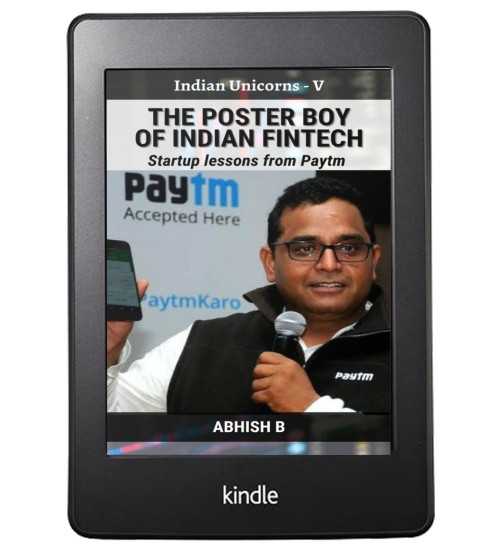If you want to achieve something significant that leaves a mark; you need to think out of the box, work on it relentlessly but logically, and need to have will and open-mindedness to analyze things objectively and make the required decisions.
There are thousands of people who have achieved this feat by their hard work, analyzing the situations rightly, taking remarkable decisions and sheer will.
Such journeys often inspire many other fellows. One of the best ways to achieve success, is learning lessons from other successful fellows’ journeys.
So, when we came across a series of books about “Indian Unicorns” by Abhish B. (available on Kindle Unlimited – to read for free!), we’ve decided to read them and share our unbiased book reviews for the same with our readers. Here are quick links to the same for the previous three books in the series:
- BYJU’s Miracle Journey | Book Review
- Zero to Billions – The Zerodha Story By Abhish B. | Book Review
- Startup Lessons from Zomato By Abhish B. | Book Review
- Startup Lessons from ZOHO By Abhish B. | Book Review
Continuing our quest to explore more details about Indian Unicorns, we’ve also explored The Poster boy of Indian Fintech: Startup Lessons from Paytm by the same author.
| Book Title | : | The Poster boy of Indian Fintech: Startup Lessons from Paytm Indian Unicorns |
| Author | : | Abhish B. |
| # of Pages | : | 51; 432 KB (Kindle EBook) |
| # of Chapters | : | 8 |
| Purchase Link(s) | : |
Here are my unbiased views and reviews for this book, on behalf Team ThinkerViwes.
This Is Here In For You
Book Cover:
As a matter of fact, despite believing in the phrase – Don’t judge a book by its cover, we acknowledge the influence of a book cover on purchase/read decisions.
Let us take a look at the cover page of this book.

The Poster boy of Indian Fintech: Startup Lessons from Paytm By Abhish B. | Book Cover
As you can see, the cover page reflects a photograph of Vijay Shekhar Sharma, the man behind PayTM; taken from a conference. You see him talking about some features of PayTM. The background reflects the brand logo and slogan. A typical mouthpiece of the company.
It will surely attract interesting readers, as per my opinion. What do you think of it?
The Book And What I Think Of It:
Usually we talk about a book in two distinguished segments, dedicated to the book story and our views for the same respectively. Based on the genre of this book, let us merge both these segments together.
Talking about Indian Fintech and not talking about PayTM is almost impossible.
By the way:
Paytm, an acronym for ‘Pay Through Mobile’.
The company is definitely one of the pioneers who changed the people of India handle financial transactions. And, as they were already quite settled in the field when the Government of India has announced demonetization of higher value currency notes. Thus the company was one of the largest beneficiaries of this black money clean up drive. As people were short of currency note, they started doing digital transactions and eventually it became a habit for many. By the way, the company caught into controversies during those times. The book also mentions the same:
On November 8 2016, the Government of India made an announcement that threw the nation into a tumult – stripping the legal status of all INR 500 and INR 1,000 banknotes of the Mahatma Gandhi Series with immediate effect.
…
Prime Minister for the bold step. While this marketing move sparked a political controversy,
The company is a brainchild of Vijay Shekhar Sharma, a middle class fellow with humble growing-up days. In order to save money he used to travel by foot for a few kilometers, and now he is the man behind one of the Indian Unicorns rose in the recent past. In fact, it is:
India’s first payment application across categories to cross over a hundred million downloads.
Also, the company has drawn investment from many non-Indian investors. While it is beneficial for the company, getting investment from Alibaba irked some controversies too.
It counts the Alibaba Group of China, the SoftBank Group of Japan and venture capital firm Elevation Capital, formerly known as SAIF Partners, among its major investors. The organization facilitated almost a billion digital.
The book talks about Vijay’s humble background in an interesting way. The author mentions:
Vijay was born on June 7 in 1978, in Harduaganj, Aligarh, in western Uttar Pradesh. His father, Sulom Prakash Sharma, was a highly principled school teacher and his mother, Asha Sharma, was a dedicated homemaker, working hard to make ends meet.
…
Vijay was the third of four siblings and grew up in a rural bubble, relatively isolated from the world at large.
Vijay, however, was brilliant in studies. Unlike some fellows who are drawn towards sports or business, having a very little interest in studies; Vijay was quite the opposite. And, when you grow in the middle-class environment it is obvious that you are drawn towards studies and doing hard-work. The passion is irked from the sheer determination to change the financial (and thus the social) situation of your family.
And, of course, the family does the best it can, to support the ambitious child. Eventually, Vijay’s further education was done in Delhi. The book mentions him specializing in Electronics and Communication at the Delhi College of Engineering or DCE, now known as the Delhi Technological University.
Vijay, like many other typical Indian students has completed his primary education in a local language – Hindi, in this case. Shifting to a metro city and studying in English medium was a challenge for him. The author made a wise decision to elaborate these points. It will inspire the enthusiasts who are thinking that the language will be a barrier for them in achieving their goals. Here are some segments from the book in that context.
… the medium of instruction throughout had been the local dialect of Hindi.
Vijay quickly realized that he needed to overcome this handicap if everything else was to fall into place.
And, he leaned towards programming.
… So, he decided to emulate the genius it represented by teaching himself how to code.
In fact:
He counted himself as part of the Internet Age, regularly donned a t-shirt which said ‘Unix Inside’ and had secretly named himself ‘Volcanix’, much like his favourite comic book character ‘Asterix’.
A typical nerd, right?
Growing up in a humble background makes young fellow to start earning at the earliest. When there are campus interviews, usually they love to get selected by a remarkable or reliable company which offers a good salary. Vijay was different, and probably this difference is responsible for his success. The book mentions:
Vijay chose to embark on an entrepreneurial journey unlike any other. He decided to not settle for a job as a first choice.
He was one of the early birds who sensed the rise of Internet in the future. Internet was sacred those days. The book discusses Vijay’s ventures in programming arena, his projects and other stuff. He seems to be a fan of interesting acronyms and abbreviations! We know that PayTM is an abbreviation (which he wanted to make popular as much as ATM). The book mentions about another interesting name:
… by XS Communications, along with three of his college mates. XS was simply an abbreviated version of the word ‘Access’, bearing the tagline “The Internet Giant”.
Being an entrepreneur, you need to have a different vision and mindset. The book talks about a very important thing in that aspect.
He also became familiar with the term ‘Golden Handcuffs’, a standard reference in business terminology that denotes a situation where so much money is given to a person that they cannot leave a company and end up tied to it.
Almost everyone, working at a remarkable position in a firm/company or even sports surely has faced this situation. Sometimes, your routine is set so nicely, you feel comfortable in the work you are doing. Based on your involvement with the entity for a long time, you are given respect and good money both. And, your family life is also settled around it. Your loan installments and other expenses are set up so tightly that you don’t want to lose that comfort. In fact, unknowingly it becomes your need. And, it often steals the opportunities for further growth from you.
The book shares an interesting quote in the same context:
“If you don’t give yourself a chance, who will? If you don’t take a chance, who will? And I think you should take a chance on you.”
– Vijay Shekhar Sharma
One more important lession one can learn form the book, is through the following quote by Vijay:
“Searching for a business model is equivalent to searching for God.”
– Vijay Shekhar Sharma
That’s correct. It is like finding the formula of delivering a commercially successful movie every time. All businesses are different. And a formula worked for a business may not work for the other in the same zone. It depends upon multiple factors. Sometimes you cannot find the reason for success or failure. So, think logically, do your assessment properly and then work hard to meet your goal.
Finding interesting lines and link with your business (like “PayTM Karo”) so it will become a household name, is also one of the requirements.
Also, you need to learn from your mistakes, you need to close the venture that is not working, and you need to apologize when things go wrong. These all are business requirements (which are equally applicable in the other aspects of life).
Understanding human psychology is a key element to run and prosper a business and is not limited to strengthening business-customer relations. It is applied in management-employee relations as well. Here is an interesting line from the book:
“Men work for three things: Money, Title and Job Satisfaction in that sequence, while on the other hand, women work for the same three things in the reverse order of importance.”
I think these quotes are enough for you to determine the quality and nature of writing you can expect from this book.
I want to conclude with another interesting lesson from the book. When you find reliable fellows (be it a friend or a relative or an employee), if you find him/her genuine, skillful and trustworthy, you should remain together. So, when your business is to be expanded, you can easily distribute responsibilities. Because, no matter how skillful a person is. He/she has limited time and resources to manage multiple tasks. Harinder Takhar, Abhishek Rajan,… are in key positions and they are with Vijay since long.
Here is one of the one liners that stayed with me after completing the book:
No fear, no greed, no entitlement.
The book could have been more detailed in terms of some interesting events. If some incidents are re-arranged chronologically, it would have better impact. A lot of this information is available in the public domain, so having something more lesser-known or unknown details could have increased book value in every aspect.
Summary:
Overall, an interestingly written motivational book. It is good to explore this book to understand entrepreneurial mindset. If you are already a “Kindle Unlimited subscriber”, you should definitely go for it.
ThinkerViews Rating:
I would give it around 7.5 stars out of 10.
Quick Purchase Links:
- Buy - The Poster boy of Indian Fintech: Startup Lessons from Paytm by Abhish B. - Kindle EBook - Amazon IN
- Buy - The Poster boy of Indian Fintech: Startup Lessons from Paytm by Abhish B. - Kindle EBook - Amazon US
Over To You:
If you already have read the book do share your remarks and thoughts via comments below. Does this review help you in making your decision to buy or read the book? Do not forget to share this article with your friends over various social networks. Please follow/subscribe us on various Social networks like Twitter, Facebook, YouTube, Spotify, Amazon Prime Music, Audible, and others. And yes, you may like to subscribe to our RSS feeds to get latest updates for the site to land right in your mail box.
 ThinkerViews – Views And Reviews Personal views and reviews for books, magazines, tv serials, movies, websites, technical stuff and more.
ThinkerViews – Views And Reviews Personal views and reviews for books, magazines, tv serials, movies, websites, technical stuff and more.



